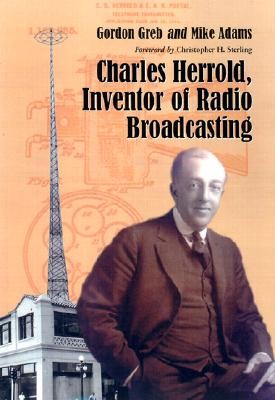
- We will send in 10–14 business days.
- Author: Gordon Greb
- Publisher: McFarland & Company
- ISBN-10: 0786416904
- ISBN-13: 9780786416905
- Format: 17.7 x 25.4 x 1.5 cm, softcover
- Language: English
- SAVE -10% with code: EXTRA
Reviews
Description
Still broadcasting today, the world's first radio station was invented by Charles Herrold in 1909 in San Jose, California. His accomplishment was first documented in a notarized statement written by him and published in the Electro-Importing Company's 1910 catalog: "We have given wireless phone concerts to amateur wireless men throughout the Santa Clara Valley." Being the first to "broadcast" radio entertainment and information to a mass audience puts him at the forefront of modern day mass communication. This biography of Charles Herrold focuses on how he used primitive technology to get on the air. Today it is a 50,000-watt station (KCBS, in San Francisco). The authors describe Herrold's story as one of early triumph and final failure, the story of an "everyman," an individual who was an innovator but never received recognition for his work and, as a result, died penniless. His most important work was done between 1912 and 1917, and following World War I, he received a license and operated station KQW for several years before running out of money. Herrold then worked as a radio time salesman, an audiovisual technician for a high school, and a janitor at a local naval facility, still telling anyone who would listen to him that he was the father of radio. The authors also consider some other early inventors, and the directions that their work took.
EXTRA 10 % discount with code: EXTRA
The promotion ends in 20d.13:27:21
The discount code is valid when purchasing from 10 €. Discounts do not stack.
- Author: Gordon Greb
- Publisher: McFarland & Company
- ISBN-10: 0786416904
- ISBN-13: 9780786416905
- Format: 17.7 x 25.4 x 1.5 cm, softcover
- Language: English English
Still broadcasting today, the world's first radio station was invented by Charles Herrold in 1909 in San Jose, California. His accomplishment was first documented in a notarized statement written by him and published in the Electro-Importing Company's 1910 catalog: "We have given wireless phone concerts to amateur wireless men throughout the Santa Clara Valley." Being the first to "broadcast" radio entertainment and information to a mass audience puts him at the forefront of modern day mass communication. This biography of Charles Herrold focuses on how he used primitive technology to get on the air. Today it is a 50,000-watt station (KCBS, in San Francisco). The authors describe Herrold's story as one of early triumph and final failure, the story of an "everyman," an individual who was an innovator but never received recognition for his work and, as a result, died penniless. His most important work was done between 1912 and 1917, and following World War I, he received a license and operated station KQW for several years before running out of money. Herrold then worked as a radio time salesman, an audiovisual technician for a high school, and a janitor at a local naval facility, still telling anyone who would listen to him that he was the father of radio. The authors also consider some other early inventors, and the directions that their work took.


Reviews